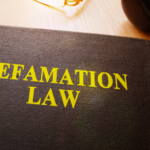Former Deputy NSW Premier Wins Defamation Case

Australia has been described as ‘the defamation capital of the world’ due to the ease by which defamation can be established – without requirements such as ‘actual malice’ when it comes to public figures, and the limited defences available to defamation.
John Barilaro wins defamation case
That description has been reinforced by the Federal Court of Australia’s recent award to former deputy New South Wales premier John Barilaro’s of $715,000 over videos produced by political satirists the Friendlyjordies and published to their YouTube channel.
The videos
The videos, published in 2020, asserted that Mr Barilaro was a corrupt politician, that he corruptly granted $3.5 million to a beef company, that he corruptly voted against a Royal Commission into water theft, that he blackmailed councillors for financial benefit and committed the offence of perjury. They also made racial slurs against the politician, including calling him a “wog”.
And while the videos were considered tongue-in-cheek and even comedic by many, the former deputy premier certainly did not see them that way, commencing defamation proceedings against Friendlyjordies presenter Jordan Shanks.
Fixated persons unit
And after the channel’s producer, Kristo Langker, approached Mr Barilaro and questioned him about why he could commence such proceedings, the NSW Police Fixated Persons Investigations Unit stepped in and arrested the producer, charging him with two counts of stalking.
Criminal charges dropped
Those charges were ultimately withdrawn due to insufficient evidence, and Mr Langker is currently considering commencing civil proceedings against the New South Wales Police Force over what he believes was a baseless and malicious prosecution.
Shanks apologises and settles
In November 2021, Mr Shanks settled the defamation case against him by issuing a public apology, amending the videos to delete the allegedly defamatory content and paying Mr Barilaro $100,000 in legal costs.
Mr Shanks then posted a video about the settlement.
Federal Court decision
But while Mr Shanks settled, the Federal Court heard evidence that YouTube refused to delete the videos in a timely manner after being requested to do so.
The proceedings therefore continued against Google, the owner of YouTube, who, unlike in many other nations where ‘third party publishers’ are not responsible for content uploaded by others, can be considered liable for content linked to its search engine or uploaded to its social media channels.
In its judgement delivered on 6 June 2022, Federal Court Justice Steve Rares found the videos to be “deeply offensive, racist and vilifying” and represented a “relentless and vicious campaign” of cyberbullying, which led him to resign from politics earlier than he had intended to, and also caused him significant trauma”.
His Honour found that the videos provoked thousands of “hateful” and “disturbing” social media posts, comments and messages, including one which suggested Barilaro’s daughter should be raped.
During the course of the proceedings, Google admitted the videos defamed Barilaro in the context of Australian defamation laws, and a special trial was held to determine how much the tech giant should pay in damages.
In determining that amount, his Honour remarked that “the right to criticise is not a licence to vilify, cyberbully, direct hate speech at, or make baseless attacks – on anyone, even a high-profile and controversial politician.”
He also determined that “Google did not play a passive role. It earned not insignificant revenue from publishing Mr Shanks’ videos. It could control whether or not they remained available on YouTube, yet it chose to do nothing.”
In the result, the court ordered $675,000 in damages, plus $40,000 in pre-judgment interest.
The amount Google will be required to pay in legal costs will be determined at a later date.
Google and Shanks referred for potential contempt of court charges
Adding to the woes of Google and especially Mr Shanks, his Honour referred the parties to the registrar of the Federal Court for to consider whether contempt of court charges should be brought against them for videos which allegedly made ‘baseless’ claims about Mr Bailario’s legal team.
A contempt of court is an act which has the tendency to interfere with or undermine the authority, performance or dignity of the court or those who participate in court proceedings.
The following conduct has been found to meet the legal test for contempt:
- Protracted swearing and yelling at a magistrate,
- Filming witnesses in an attempt to intimidate them,
- Evading questions in court or refusing to answer them,
- Refusing to take an oath or affirmation in court,
- Refusing to leave the courtroom after being directed to do so, and
- Disobeying court orders such as subpoenas to attend court or to produce evidence.
The courts have made clear that a contempt charge should be used as a ‘last resort’ to deal with unruly persons within the courtroom, and all other possible options should be considered before resorting to formal charge.
These options include:
- Giving a warning,
- Directing a person to leave the courtroom,
- Providing an opportunity to seek legal advice, such as advice relating to the privilege against self-incrimination when being asked questions on the witness stand,
- Considering whether the matter should be referred to the Attorney General for consideration of charging the person with engaging in disrespectful behaviour in court.
The courts have further found that rudeness or extreme discourtesy by lawyers does not amount to contempt.
In addition to this, the courts have made clear that, like police officers, magistrates and judges should be able to resist the sting of insults directed at them, as they are trained to be level-headed and to keep calm under stressful situations.
They should not, therefore, resort to a charge of contempt until and unless it is completely necessary.
The maximum penalty for contempt of court against an individual in New South Wales is 28 days in prison and/or 20 penalty units, which is currently $2,200.
What does the prosecution have to prove?
For a person to be found guilty of contempt of, the prosecution must establish each of the following ‘elements’ (or ingredients) of the offence beyond reasonable doubt:
- The defendant engaged in conduct which had the tendency to interfere with or undermine the authority, performance or dignity of the court or those who participate in court proceedings, and
- The defendant intended to do the act.
The prosecution will fail if it cannot prove each of these elements to the required standard.
It is important to note, however, that the prosecution is not required to prove that the defendant intended to actually interfere with the administration of justice – just that he or she intended to do an act which, viewed by a reasonable person, had the tendency to do so.
This is known as an ‘objective test’ and means the defendant’s reasons behind doing the act are not determinative of the offence.
What are the defences?
In addition to the requirement to prove each element of the offence, the prosecution must also disprove any of the following defences if properly raised:
- Duress, which is where a person was threatened or coerced,
- Necessity, where the act was necessary to avert danger, and
- Self-defence, where a person engaged in the act to defend him or herself, or another.
It must disprove any such defences beyond all reasonable doubt.
Changes to Defamation laws in New South Wales
In 2021, the New South Wales Government implemented defamation reforms which aimed to clarify how settlements and damages are awarded.
One of the reasons behind the law changes was to reduce the size of payouts, but the changes to the Defamation Amendment Act 2020 also include the instruction of mandatory concerns notices, the element of serious harm and an additional public interest defence.
Concerns notices
Specifically, under the new laws, defamation proceedings cannot begin until 28 days after an aggrieved person has issued a ‘concerns notice’ to the source of alleged defamation, that is the party that would potentially be a defendant in any future defamation suit.
The notice must specify the allegations and the evidence of possible defamation. During this 28 day period, the other party has the opportunity to respond, and if necessary apologise and provide an offer to make amends. If this offer is satisfactory and accepted, then defamation proceedings cannot proceed.
This is intended to keep smaller defamation cases out of the courts. If disputes can be settled outside of the court process, then it will take some pressure off the justice system. Defamation suits have been on the rise in recent years, and they can be protracted, requiring significant court resources.
Serious harm
A new element has been introduced – serious harm – however this needs to be determined by a judicial officer prior to any civil trial proceeding, so that the costs and time are not wasted if the element cannot be proven – this is designed to keep ‘trivial’ matters outside of the courts.
Responsible communication in the public interest
Another significant change in the law is the introduction of a new defence – responsible communication in the public interest.
This is a potential defence for anyone accused of defamation who can prove that the material published was in the public interest and that they reasonably believed they were acting in the public interest by producing or publishing the material.








